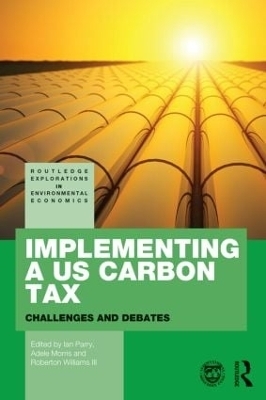
Implementing a US Carbon Tax
Routledge (Verlag)
978-1-138-82536-9 (ISBN)
This book is about the practicalities of introducing a carbon tax, set against the broader fiscal context. It consists of thirteen chapters, written by leading experts, covering the full range of issues policymakers would need to understand, such as the revenue potential of a carbon tax, how the tax can be administered, the advantages of carbon taxes over other mitigation instruments and the environmental and macroeconomic impacts of the tax.
A carbon tax can work in the United States. This volume shows how, by laying out sound design principles, opportunities for broader policy reforms, and feasible solutions to specific implementation challenges.
Ian Parry is Principal Environmental Fiscal Policy Expert in the Fiscal Affairs Department of the IMF Adele Morris is a fellow and policy director for Climate and Energy Economics at the Brookings Institution. Roberton C. Williams III is a Professor in the Department of Agricultural and Resource Economics at the University of Maryland, Senior Fellow and Director of Academic Programs at Resources for the Future, and a Research Associate of the National Bureau of Economic Research.
1. Carbon Taxes as Part of the Fiscal Solution 2. Choosing among Mitigation Instruments: How Strong is the Case for a US Carbon Tax? 3. Administration of a US Carbon Tax 4. Carbon Taxes to Achieve Emissions Targets – Insights from EMF 24 5. Macroeconomic Effects of Carbon Taxes 6. The Distributional Burden of a Carbon Tax: Evidence and Implications for Policy 7. Offsetting a Carbon Tax’s Burden on Low-Income Households 8. Carbon Taxes and Corporate Tax Reform 9. Carbon Taxes and Energy Intensive Trade Exposed Industries: Impacts and Options 10. The Role of Energy Technology Policy Alongside Carbon Pricing 11. Mixing It Up: Power Sector Energy and Regional and Regulatory Climate Policies in the Presence of a Carbon Tax 12. Implications of Carbon Taxes for Transportation Policies 13. Comparing Countries’ Climate Mitigation Efforts in a Post-Kyoto World
| Erscheint lt. Verlag | 30.1.2015 |
|---|---|
| Reihe/Serie | Routledge Explorations in Environmental Economics |
| Zusatzinfo | 21 Tables, black and white; 40 Line drawings, black and white; 40 Illustrations, black and white |
| Verlagsort | London |
| Sprache | englisch |
| Maße | 156 x 234 mm |
| Gewicht | 570 g |
| Themenwelt | Naturwissenschaften ► Biologie ► Ökologie / Naturschutz |
| Recht / Steuern ► Steuern / Steuerrecht | |
| Technik ► Umwelttechnik / Biotechnologie | |
| Wirtschaft ► Volkswirtschaftslehre ► Wirtschaftspolitik | |
| ISBN-10 | 1-138-82536-0 / 1138825360 |
| ISBN-13 | 978-1-138-82536-9 / 9781138825369 |
| Zustand | Neuware |
| Haben Sie eine Frage zum Produkt? |
aus dem Bereich


